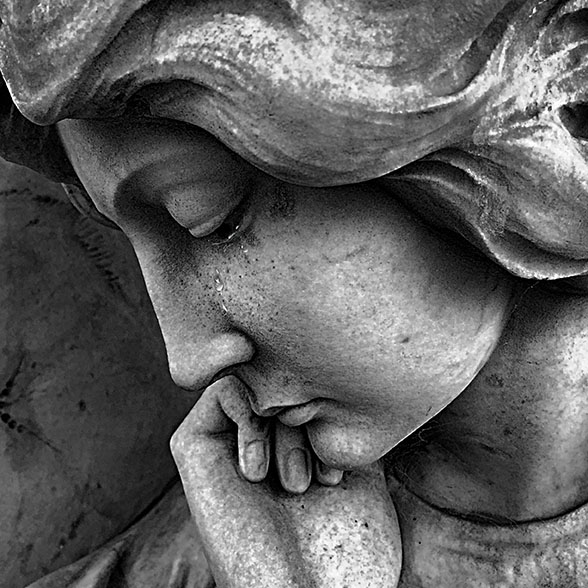Love in Liquid Form

When my husband died, although I didn’t discover it till much later, I cried so much that my eyelashes fell out! I didn’t connect the two until I showed a friend the huge gaps in them. “I think your eyelashes were probably washed away in the river of tears” she said and I realized she was probably right.
Perhaps like many of you, I tried not to cry too much in front of others, in particular my children. In parenting through grief, there’s always a balance between not trying to be a blank screen (modelling the healthy processing of normal emotions) and completely falling apart (causing your children to worry about whether they’re going to lose TWO parents!) I tried very hard to find that balance although I’m not sure I always got it exactly right.
Wave of sorrow
Langston Hughes 1902 – 1967
Do not drown me now.
I see the island
Still ahead somehow.
I see the island
And its sands are fair:
Wave of sorrow,
Take me there.
So I ended up crying on my own a lot. Crying in the shower (conveniently washes the salt off your face at the same time;) crying while driving, (which can be dangerous, since they have yet to invent windshield wipers for your eyes – I recommend pulling over!) and quietly crying myself to sleep most nights.
I was astonished at the ocean of sorrow that washed over me and flowed perpetually from me. I remember thinking “If the body is 75% water, I must have only 25% of my body left!” Often when I cried unexpectedly or burst into tears in front of others, I felt like a hot mess or an embarrassment. Crying can make us feel shame for looking weak or incapable when we are simply heart-broken and bereaved.
Crying is a normal, healthy response to grief and loss, and grief is a measure of love. You don’t cry for someone you only miss a little. So Big Love, Big Grief. Big Grief, rivers of tears and disappearing eyelashes. As Kahlil Gibran said “When you are sorrowful, look again in your heart, and you shall see that in truth, you are weeping for that which has been your delight.”
Science tells us that crying for an extended period of time actually releases oxytocin and endorphins. Oxytocin is the “attachment” hormone – the same one you feel when falling in love, in intense sexual union, in bonding with your newborn. So crying over your beloved can have the odd effect of reinforcing the connection to feel to them. Endorphins are the magical “feel good” hormones that arise when you are nurtured in childhood or loved any time in your life; they’re the ones that make you feel better when you exercise or eat a good meal, and they relieve pain and stress, help you sleep, ward off depression and just generally improve your well-being. All these hormones, released when crying, are very helpful to us.
We need help, because grief comes in waves that are unpredictable. Often it can feel like a tsunami and you’re in fear of being engulfed, swept away and drowned. Honouring your grief can be like building yourself a surfboard or a vessel that you hope can withstand the waves. At times you’ll have a better day or moment and you will be surfing the wave and thinking “I can do this.” At other times you’ll feel like you’re clinging to pieces of debris and barely staying afloat.
Four years out, heading toward Langston Hughes’ island (but not there yet!) I think I’ve come to the conclusion that a certain amount of grief just has to be cried out. You are full, full to overflowing of memories and sorrow and it can’t help but fill your heart, spilling out of your eyes and tumbling down your cheeks in torrents.
So if your mother may have told you (as mine has many times in my life) “Go ahead and have a good cry, you’ll feel a lot better” she is (yet again, Mom!) absolutely right. Go ahead, have a good cry. You WILL feel better. Maybe not right away, but it will still be good for you in the end. Cry yourself a river or an ocean of tears. It’s only your love in liquid form.
